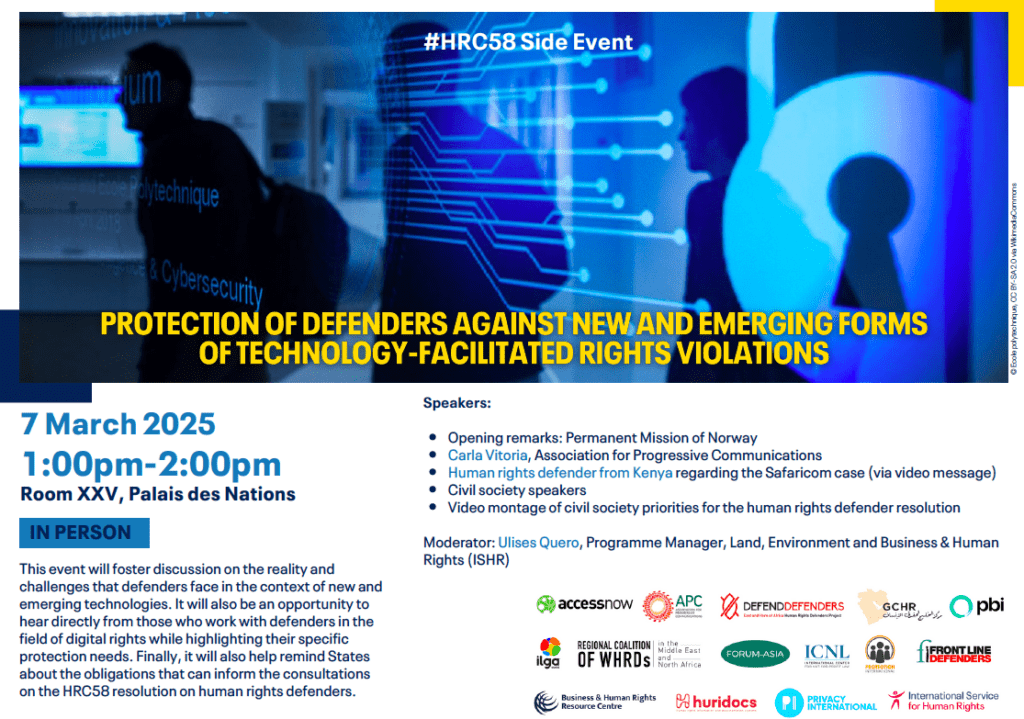58th session UN Human Rights Council
Side Event: Protection of HRDs Against New and Emerging Forms of Technology-Facilitated Rights Violations
Date: 7 March 2025 Time: 1PM Room: XXV
Co-sponsors: Access Now, Asian Forum for Human Rights & Development (FORUM-ASIA), Association for Progressive Communications (APC), Business and Human Rights Resource Centre (BHRRC), DefendDefenders (East and Horn of Africa HRD Project), Front Line Defenders, Gulf Centre for Human Rights (GCHR), Huridocs, International Center for Not-for-Profit Law (ICNL), International Lesbian, Gay, Bisexual, Trans and Intersex Association (ILGA World), International Service for Human Rights (ISHR), Peace Brigades International, Privacy International, Protection International, Regional Coalition of WHRDs in Southwest Asia and North Africa (WHRD MENA Coalition)
New and emerging technologies have changed the way we interact with and see the world. They have also become a fundamental tool for human rights defenders to conduct their activities, boost solidarity among movements and reach different audiences, CSOs, and the general public. Unfortunately, these positive aspects have been overshadowed by negative impacts of new and emerging technologies on the enjoyment of human rights, including increased threats and risks for human rights defenders. While we see the increased negative impacts of new technologies, we do not see that governments are addressing these impacts comprehensively.
Human rights defenders are increasingly subject to surveillance, monitoring, violations of their right to privacy, prosecution for so-called cyber-crimes when accessing the internet and mobile networks, as well as targeted violence, harassment, disinformation and misinformation on social media, cybersecurity vulnerabilities in the form of malware, spyware, and other technical attacks, and threats to their communications and identities, including via deceptive and maliciously-generated synthetic media. In addition, courts in many jurisdictions allow strategic lawsuits against public participation, imposing harsh civil and criminal penalties for legitimate online activities like newsgathering, tweeting, and the sharing of information in the public interest.
Furthermore, States and their law enforcement agencies (often through the help of other non-state actors, including business enterprises) often take down or censor the information shared by defenders on social media and other platforms. In other cases, we have seen that businesses are also complicit in attacks and violations against human right defenders.
Conversely, lack of access to the internet and the digital gaps in many countries and regions, or affecting specific groups, limits the potential of digital technologies for activism and movement building, as well as access to information.
The Declaration on Human Rights Defenders, adopted in 1998, does not consider these challenges, which have largely arisen with the rapid evolution of technology. In this context, and, as part of activities to mark the 25th anniversary of the UN Declaration on human rights defenders, a coalition of NGOs launched a consultative initiative to identify the key issues faced by human rights defenders that are insufficiently addressed by the UN Declaration, including on the area of digital and new technologies. These issues are also reflected in the open letter to States on the draft resolution on human rights defenders that will be considered during the HRC58.
This side event will be an opportunity to continue discussing the reality and the challenges that human rights defenders face in the context of new and emerging technologies. It will also be an opportunity to hear directly from those who, on a daily basis, work with defenders in the field of digital rights while highlighting their specific protection needs. Finally, the event will also help remind states about the range of obligations in this field that can contribute to inform the consultations on the HRC58 resolution on human rights defenders.
PANEL:
Opening Remarks: Permanent Mission of Norway
Speakers:
- Carla Vitoria – Association for Progressive Communications
- HRD from Kenya regarding the Safaricom case (via video message)
- WHRD from Colombia regarding use of new technologies during peaceful protest (TBC)
- HRD from Myanmar regarding online incitement to violence against Rohingya (in person – TBC)
Video montage of civil society priorities for the HRD resolution at HRC58
Moderator: Ulises Quero, Programme Manager, Land, Environment and Business & Human Rights (ISHR)


